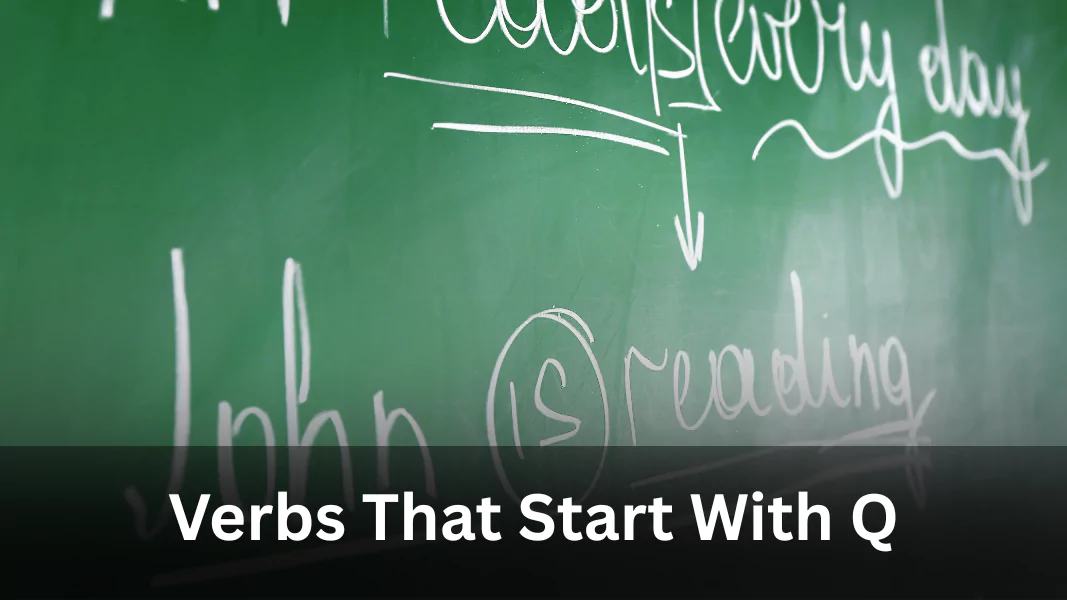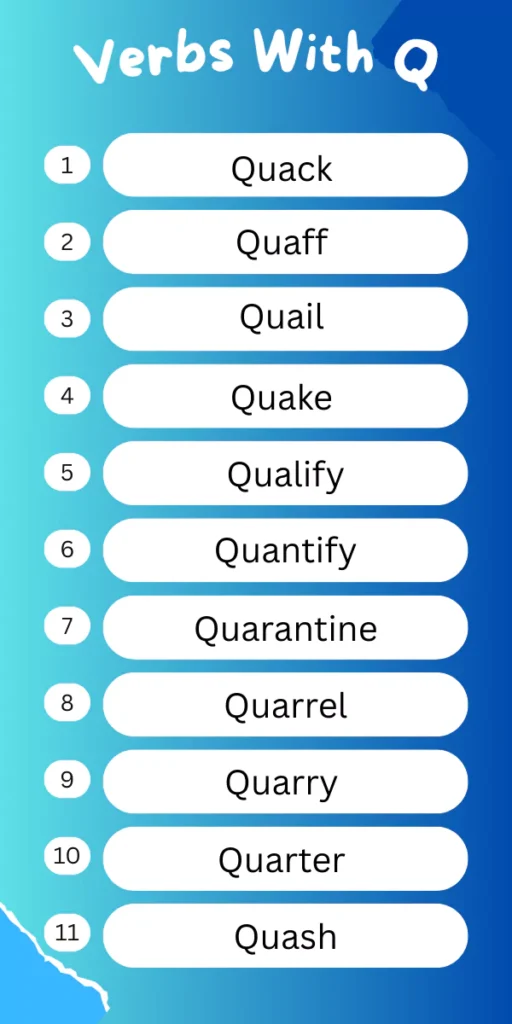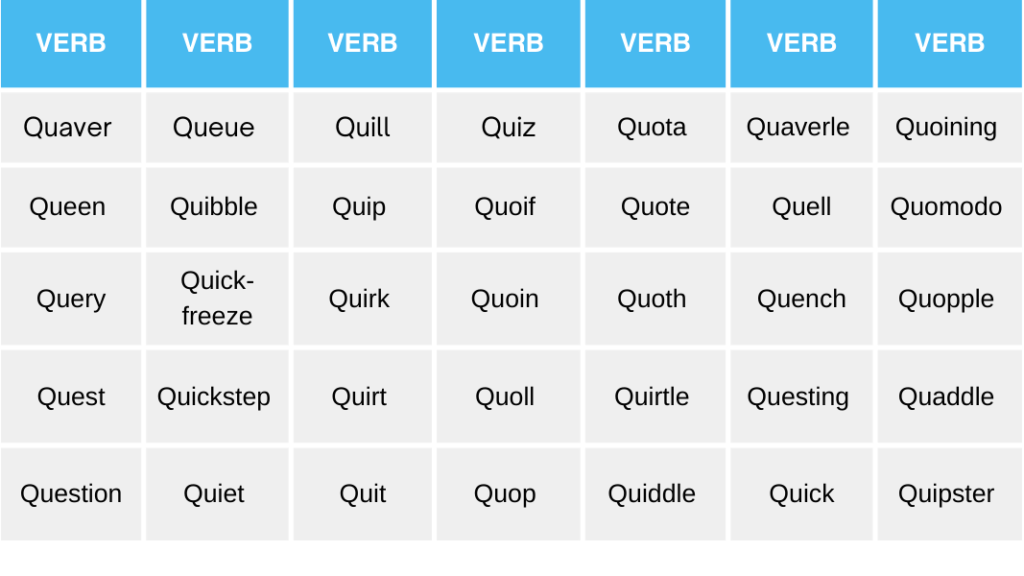Verbs That Start With Q – Complete List, Meanings & Examples

Verbs are the engines of language, driving our sentences forward and giving life to our thoughts, actions, and ideas. Among them, verbs that start with the letter Q stand out as rare yet powerful gems. Though fewer in number, these verbs carry a sense of uniqueness, elegance, and impact that can enrich both everyday conversations and creative writing. From words like quicken that suggest energy and speed, to quell that conveys calm and control, Q-verbs add depth, character, and a touch of intrigue to the way we communicate. Exploring these verbs not only strengthens vocabulary but also sparks curiosity, making them especially engaging for learners, writers, and language enthusiasts alike.
List of Verbs That Start With Q
The letter Q may not be the most common starting point for verbs, but the ones it does offer are both meaningful and versatile. The following list includes a range of verbs beginning with Q, from simple and kid-friendly options to more advanced and impactful ones. Whether you’re expanding your vocabulary, enhancing your writing, or teaching young learners, these verbs provide an excellent way to explore the richness of the English language.

Common Verbs Starting With Q
- Quack – to make the sound of a duck.
Example: The duck began to quack loudly at the pond. - Quaff – to drink deeply or heartily.
Example: He quaffed a glass of cold water after the long run. - Quail – to shrink back in fear.
Example: The child did not quail before the barking dog. - Quake – to shake or tremble.
Example: The ground began to quake during the tremor. - Qualify – to meet the necessary standards or conditions.
Example: She did not qualify for the scholarship this year. - Quarrel – to argue or fight verbally.
Example: The siblings often quarrel over small things. - Quash – to reject or suppress completely.
Example: The court quashed the false claims. - Quaver – to speak or sound in a trembling voice.
Example: His voice quavered as he shared the news. - Quell – to suppress or put an end to something.
Example: The police were called to quell the disturbance. - Query – to ask a question.
Example: He queried the manager about the new rules. - Question – to ask for information or interrogate.
Example: The detective questioned the witness carefully. - Queue – to line up or form a sequence.
Example: People began to queue outside the theater. - Quibble – to argue over minor details.
Example: They quibbled over the exact wording of the contract. - Quit – to stop or leave something.
Example: He decided to quit smoking last year. - Quote – to repeat words spoken or written by someone.
Example: She often quotes lines from her favorite books.
Positive Verbs Starting With Q
| Verb | Meaning | Example |
|---|---|---|
| Quicken | to make faster, to enliven | His smile quickened her heartbeat. |
| Qualify | to earn a place or right | She qualified for the finals with ease. |
| Quench | to satisfy thirst or extinguish | Water quenched their thirst after the hike. |
| Quip | to make a witty remark | She quipped about the situation and lightened the mood. |
| Quest | to search for something meaningful | He quested for knowledge his entire life. |
| Quell | to bring peace or calmness | Her words quelled the child’s fears. |
| Quaver | to sing or speak in a trembling but moving way | Her voice quavered with emotion as she spoke. |
| Qualitize | to improve quality (modern/rare usage) | The company aims to qualitize its services every year. |
| Quicken | to inspire life or spirit | The teacher’s encouragement quickened their ambition. |
| Quote | to share inspiring words | He quoted a famous leader to motivate his team. |
| Quip | to joke in a lighthearted way | He quipped that coffee was his morning fuel. |
| Quiver | to tremble with excitement | She quivered with joy on hearing the news. |
| Quiet | to calm or hush | The mother quieted the crying baby. |
| Quickstep | to move with liveliness (dance/action) | They quickstepped across the dance floor gracefully. |
| Quintuple | to increase five times | Their sales quintupled after the promotion. |
Action Verbs Starting With Q
- Quake – to shake strongly.
Example: The building quaked during the explosion. - Quell – to stop forcefully.
Example: The army quelled the uprising quickly. - Quarrel – to engage in a dispute.
Example: They often quarrel over small differences. - Quash – to crush or suppress.
Example: The teacher quashed the rumor immediately. - Quaff – to drink deeply.
Example: The men quaffed beer after work. - Queue – to wait in line.
Example: Students queued to enter the hall. - Quickstep – to move briskly.
Example: She quickstepped to catch the train. - Quit – to leave or abandon.
Example: He quit the game in frustration. - Quibble – to argue trivially.
Example: They quibbled over who was right. - Question – to inquire actively.
Example: The journalist questioned the minister boldly. - Query – to request information.
Example: She queried the librarian about the book. - Quip – to remark playfully.
Example: He quipped about her new hairstyle. - Quiver – to shake or tremble.
Example: The leaf quivered in the wind. - Quench – to extinguish or satisfy.
Example: Firefighters quenched the flames quickly. - Quarantine – to isolate for safety.
Example: The patient was quarantined for two weeks.
Regular Verbs That Start With Q
- Quack – quacked
Example: The ducks quacked at dawn. - Quaff – quaffed
Example: He quaffed the juice eagerly. - Quail – quailed
Example: They quailed before the challenge. - Quake – quaked
Example: The city quaked during the storm. - Quarrel – quarreled
Example: The brothers quarreled about the chores. - Quash – quashed
Example: The government quashed the protest. - Quaver – quavered
Example: His voice quavered with fear. - Quell – quelled
Example: The nurse quelled the patient’s worries. - Query – queried
Example: She queried him about the deadline. - Question – questioned
Example: The officer questioned the suspect. - Queue – queued
Example: Fans queued for tickets all night. - Quibble – quibbled
Example: They quibbled over the details. - Quit – quitted/quit (both used, but quit is more common).
Example: She quit the job last year. - Quote – quoted
Example: He quoted a famous poet in his speech. - Quarantine – quarantined
Example: They quarantined the animals to ensure safety.
Irregular Verbs Starting With Q
- Quit – quit/quitted – quit/quitted
Meaning: To stop doing something.
Example: She quit smoking last year. - Quiz – quizzed – quizzed (modern, but historically “quiz/quizzed” used irregularly)
Meaning: To question or test.
Example: The teacher quizzed the students on history. - Quick-freeze – quick-froze – quick-frozen (compound irregular)
Meaning: To freeze rapidly.
Example: The factory quick-froze the vegetables for storage. - Quench – quenched – quenched (sometimes considered irregular in Old English)
Meaning: To extinguish or satisfy.
Example: He quenched his thirst with water. - Quest – quested – quested (archaic irregular use with vowel changes in Middle English)
Meaning: To search or go on an adventure.
Example: Knights quested for the Holy Grail. - Quill – quilled – quilled (historical variant with irregular participle in Old English)
Meaning: To write or decorate with a quill.
Example: She quilled a note with delicate strokes. - Quirk – quirked – quirken (archaic)
Meaning: To twist suddenly.
Example: He quirked his eyebrow in surprise. - Quell – quelled – quelled (but irregularly used in Middle English)
Meaning: To suppress or calm.
Example: The army quelled the rebellion. - Quaver – quove – quoven (obsolete irregular form)
Meaning: To tremble or shake in speech.
Example: His voice quavered as he sang. - Quake – quoke – quaken (Middle English irregular form)
Meaning: To shake or tremble.
Example: The earth quaked during the storm. - Quoth (archaic)
Meaning: Said (used in old English, irregular of “quethen”).
Example: “Nevermore,” the raven quoth. - Quid – quid – quid (British slang, irregular use like “read”)
Meaning: To chew (esp. tobacco).
Example: He quid the tobacco slowly. - Quist (archaic past of “quiesce”)
Meaning: To become quiet, rest.
Example: The crowd quist after the speech. - Quillate – quillate – quillate (semi-irregular, archaic)
Meaning: To adorn with quills.
Example: The garment was quillated with feathers. - Quop – quop – quopped (archaic irregular)
Meaning: To throb or palpitate.
Example: His heart quopped with excitement.
Phrasal Verbs Starting With Q
| Verb | Meaning | Example |
|---|---|---|
| Queue up | to line up | Fans queued up outside the stadium. |
| Quit on | to stop supporting or functioning | His car quit on him in the middle of the road. |
| Quarrel with | to argue or disagree | She quarreled with her best friend. |
| Quake at | to tremble in fear of | He quaked at the thought of failure. |
| Quibble over | to argue about small details | They quibbled over the cost of dinner. |
| Question about | to ask regarding something | The officer questioned him about the incident. |
| Quicken up | to speed up | The runner quickened up in the last lap. |
| Quench down | to reduce or suppress | They quenched down the fire quickly. |
| Quieten down | to calm or become quieter | The teacher asked the class to quieten down. |
| Quit out of | to exit something | He quit out of the game early. |
| Quarrel over | to argue about | The neighbors quarreled over the fence. |
| Queue for | to wait in line for | People queued for tickets all night. |
| Quicken to | to respond quickly to | She quickened to his call. |
| Quibble with | to find fault with | He always quibbles with the rules. |
| Quash out | to stamp out or reject | The board quashed out the false proposal. |
Rare and Unique Verbs Starting With Q
- Quop – to throb or palpitate.
Example: His heart quopped in fear. - Quirl – to coil or twist.
Example: The ribbon quirled around her wrist. - Quist – to quieten, to rest (archaic).
Example: The town quist at night. - Quirlwind (archaic) – to whirl or spin.
Example: The leaves quirlwinded in the air. - Queme – to please or satisfy (Middle English).
Example: The praise quemed his heart. - Quiddle – to fuss over trivial things.
Example: She quiddled with the decorations all day. - Quopple – to throb repeatedly.
Example: His pulse quoppled after the sprint. - Quirlify – to ornament with curls.
Example: The artist quirlified the manuscript margins. - Quass – to crush or press.
Example: They quassed the herbs into powder. - Quall – to die or perish (archaic).
Example: Many qualled during the famine. - Quopplegate (dialect) – to stagger or hobble.
Example: He quopplegated across the yard. - Quassinate – to ferment (rare scientific usage).
Example: The liquid quassinated over time. - Querr – to complain or grumble (dialectal).
Example: He querrred about his chores. - Quemeen – to flatter (obsolete).
Example: Courtiers quemeened the king endlessly. - Quab – to throb, quake (Middle English).
Example: His muscles quabbed with strain.

Popular & Impactful Verbs That Start With Q
| Verb | Meaning | Example |
|---|---|---|
| Quicken | to make faster | His heart quickened with excitement. |
| Qualify | to earn a right or place | She qualified for the finals. |
| Quench | to satisfy or extinguish | They quenched their thirst with water. |
| Quell | to suppress or calm | The speech quelled the angry crowd. |
| Question | to ask for information | The reporter questioned the official. |
| Queue | to line up | Fans queued outside the concert hall. |
| Quit | to stop or resign | He quit his job after five years. |
| Quote | to repeat words | She quoted Shakespeare in her essay. |
| Query | to inquire or ask | The student queried the professor. |
| Quip | to joke wittily | He quipped about the weather. |
| Quaver | to tremble while speaking | Her voice quavered with emotion. |
| Quarrel | to argue | The brothers often quarreled at dinner. |
| Quash | to suppress or reject | The judge quashed the false charges. |
| Quarantine | to isolate | They quarantined the animals for safety. |
| Quake | to tremble or shake | The ground quaked under their feet. |
Fun Facts About Words Beginning With Q
- Q Is Almost Always Followed by U – In English, nearly every word that starts with Q is followed by a U (like quick, qualify, quench). This pairing comes from Latin and French influences. A few rare exceptions exist, such as qat (a plant) or qoph (a Hebrew letter).
- Q Is One of the Rarest Letters in English – Compared to other letters, Q-words are very uncommon. In fact, Q is one of the least frequently used letters in the English language, making verbs like quicken and quell feel more unique and powerful.
- Scrabble Players Love Q-Words – Because Q is worth 10 points in Scrabble, mastering Q-verbs and other Q-words can give players a huge advantage. Words like quit, quiz, or quell are short but high-scoring.
- Q Has Ancient Roots – The letter Q traces back to the Phoenician letter qoph, meaning “monkey” or “back of the head.” Over centuries, it passed into Greek, Latin, and finally English, carrying its quirky character along the way.
- Some Q-Words Sound Regal or Mystical – Because they’re less common, many Q-verbs (quench, quell, quicken) sound more poetic, regal, or mystical, often used in literature, fantasy writing, and even religious texts. They bring a sense of drama and gravity to sentences.
FAQs
Conclusion
Verbs beginning with the letter Q may be fewer in number, but they carry a unique power, charm, and versatility in the English language. From common choices like quit, quote, and question to more impactful and poetic verbs such as quicken, quell, and quench, Q-verbs enrich our vocabulary with freshness and depth. They are not only useful in everyday conversation but also add strength to writing, speeches, and storytelling. Whether you are a student expanding vocabulary, a teacher helping kids learn new words, a writer seeking impactful expressions, or even a Scrabble enthusiast hunting for high-value terms, exploring Q-verbs can be both fun and rewarding.
